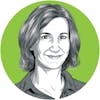 See
more of the story
See
more of the story
At Planned Parenthood, Sarah Stoesz looks around this polarized nation and sees cause for hope.
She's looking at you, South Dakota.
The U.S. Supreme Court is just days or weeks away from deciding whether access to safe and legal abortions will remain one of our rights as Americans. If the leaked draft of that ruling holds, Roe v. Wade will be overturned by the end of the month.
As the clock ticks down, the rhetoric heats up. State legislatures are preparing local abortion bans. Americans are preparing for the next court challenge to a right they once took for granted: Birth control? Gay marriage? Women's suffrage?
But Stoesz, the president and CEO of Planned Parenthood North Central States, has seen what happens when you give American voters a choice about whether or not to ban abortion.
Until the leaked Supreme Court draft opened the floodgates, few states had clamped more restrictions on abortion access than South Dakota.
In 2006, when South Dakota voters faced a ballot measure calling for a complete ban on abortions in the state, they voted it down. Then they voted it down again in 2008.
"These politicians can play to their narrow base, but they are completely out of step with the majority," Stoesz said. "I guess I'm just an eternal optimist. I see this situation with the Supreme Court as an opportunity for the country to have an important and deep conversation about abortion."
There is room for nuance in the abortion debate, Stoesz believes. If people stop screaming and start talking, they just might hear something interesting.
"One of the main reasons I am politically and philosophically a Republican is that I believe in minimal interference of government in the lives of citizens," Arne Carlson wrote in a letter to supporters in December 1989, just before Minnesota elected him governor.
"As such, I cannot support a position that causes government to intervene and to make decisions which can only be made in the heart and conscience of the individual. Thus, although I am personally opposed to abortion, I also support the right of the woman to choose the course her life will take."
Carlson is baffled by the modern GOP.
"What is this new commitment to dominating the female body?" he said during a recent interview. "I'm 87 years old. I've got enough trouble taking care of the body I've got — I can't take care of somebody else's."
Almost everybody has an abortion story — their own or about someone they love. You just have to ask.
Stoesz has spent 21 years listening to people's abortion stories.
"They know what I do and they approach me," she said. "In the grocery store, while I'm outside working in my garden, at my child's school … parents taking me aside and saying thank you."
Never once, she said, have people approached her in anger. Only deep gratitude and deepening anxiety.
Not long after the Supreme Court draft leaked, Stoesz heard about a woman who visited Planned Parenthood's Sioux Falls clinic.
"She said, 'I'm just so scared. I need birth control right now,'" Stoesz said. "She was just so scared that if she became pregnant, she could lose her life."
When Erika was 19 years old, her IUD failed.
"The best time to have kids is when it's best for you. And it wasn't the best time for me," the Minnesota woman wrote in a testimonial she shared with Planned Parenthood. We're not running her full name in the paper for reasons that should be obvious from this article's online comment section.
"It's either going to be my life and my independence that will end," Ericka's story continued. "Or this unwanted pregnancy will end, and I can continue going to school, being an athlete, being a 19- or 20-year-old girl who is still growing and learning and not ready to be a mom."
Six out of nine Supreme Court justices appear to have a different opinion about who gets to decide who's ready to be a mom.
America might want to have a conversation about that.






